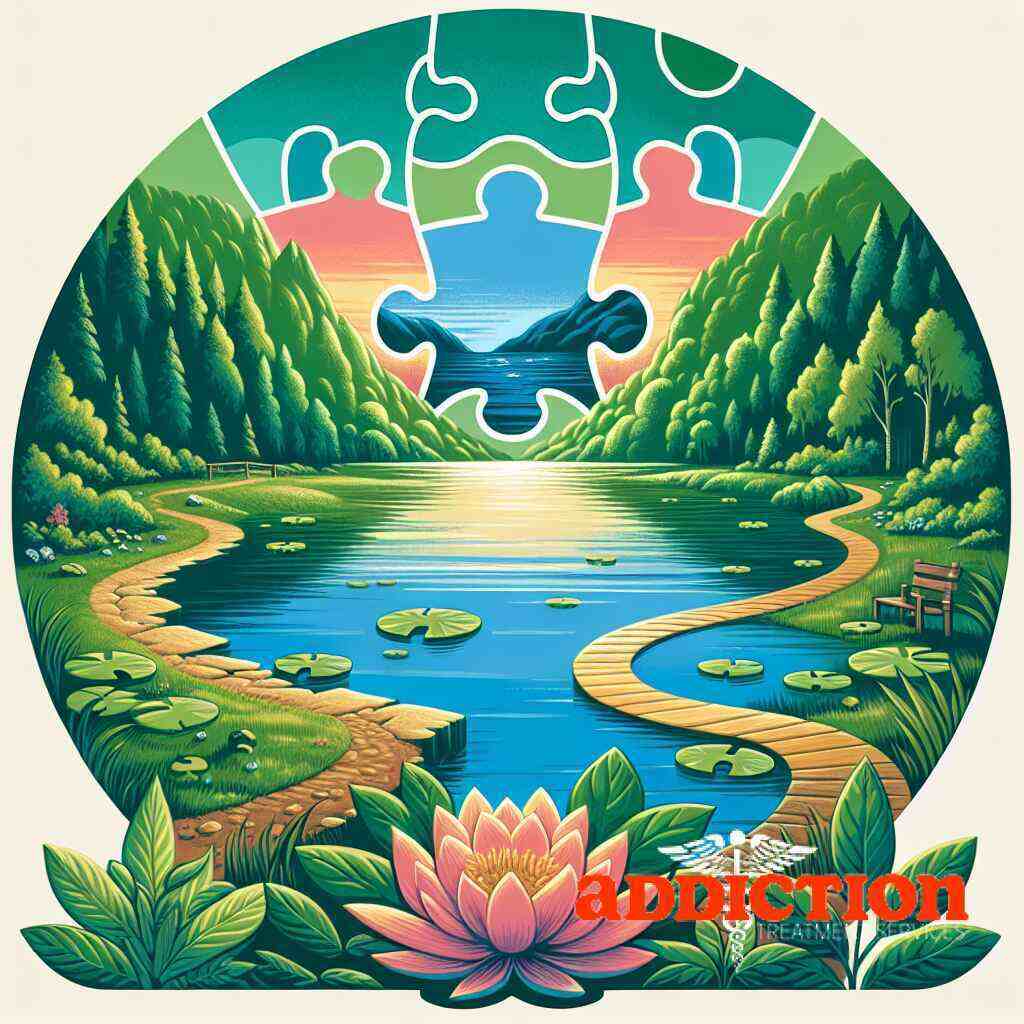 Posted On: 05/11/2024
Posted On: 05/11/2024Understanding Dual Diagnosis Care
The Intersection of Substance Abuse and Mental Health
Dual diagnosis refers to the co-occurrence of substance use disorders and mental health conditions in an individual. Those grappling with this reality face a unique set of challenges, as one condition can often exacerbate the other, creating a complex cycle that is difficult to break without proper treatment. In Ohio, recognizing the intersection between substance misuse and mental health is essential for effective care. Substance abuse can mask, mimic, or intensify mental health issues, making diagnosis and treatment a nuanced process that requires specialized attention and understanding from healthcare providers.
Importance of Integrated Treatment for Dual Diagnosis
For those battling dual diagnosis in Ohio, integrated treatment programs offer a beacon of hope. These programs are designed to address both substance use disorders and mental health conditions simultaneously, acknowledging that effective recovery involves treating the whole person. Integrated treatment models typically combine medication-assisted treatment, psychotherapy, behavioral therapies, and support services to promote healing on multiple levels. Research has shown that individuals who receive comprehensive care tailored to their dual diagnosis experiences have better outcomes, including reduced rates of relapse and improved mental health stability.
Challenges in Dual Diagnosis Recovery
Recovery from dual diagnosis poses significant challenges that are both complex and multifaceted. Firstly, the stigma surrounding both mental illness and addiction can prevent individuals from seeking the help they need. There’s also the difficulty of diagnosis, symptoms of substance abuse and mental health conditions can overlap, making it hard to untangle one issue from the other. Additionally, traditional addiction treatment services may not be equipped to handle the psychiatric aspects of dual diagnosis, and vice versa. This gap in the healthcare system often leads to fragmented care that fails to address the root causes of the individual’s problems. Furthermore, managing the expectations and realities of recovery can be another hurdle, the journey is often non-linear, requiring persistence, resilience, and a comprehensive support system to navigate successfully.
Addressing these challenges is critical for improving access to dual diagnosis care in Ohio. It necessitates a concerted effort from healthcare providers, policymakers, and community organizations to foster a more inclusive and integrated approach to addiction and mental health treatment.
Navigating Ohio’s Dual Diagnosis Care Landscape
Overview of Ohio Addiction Treatment Services
Ohio offers a wide array of addiction treatment services designed to cater to individuals struggling with substance misuse and mental health issues. The state recognizes the critical need for integrated care models that address both aspects concurrently to ensure the best outcomes for recovery. From residential treatment services to outpatient and medication-assisted recovery options, the landscape of services in Ohio is expansive, reflecting a commitment to comprehensive addiction recovery. One key advantage of Ohio’s approach is the availability of varied treatment settings, which include traditional rehab centers, holistic care facilities, and specialized dual diagnosis treatment centers. These facilities employ a mix of therapy, medication management, and supportive care, aiming to address the root causes of addiction alongside mental health conditions.
State-Specific Barriers to Accessing Dual Diagnosis Care
Despite the extensive network of Ohio addiction treatment services, there remain significant barriers that can impede access to dual diagnosis care. One of the main challenges is the lack of public awareness about the availability and importance of integrated treatment programs. Many individuals and their families are not fully aware of the nuances of dual diagnosis or the specialized care it requires. Additionally, financial constraints and limited insurance coverage can further restrict access to necessary treatments. The geography of the state also poses a barrier, with rural areas often having fewer resources and treatment centers, making it difficult for those living in these locations to receive the care they need. Efforts to mitigate these barriers include increasing funding for mental health and addiction services, expanding insurance coverage, and enhancing outreach and education efforts to raise awareness about dual diagnosis care.
Key Organizations and Resources in Ohio
To navigate the complex terrain of dual diagnosis care in Ohio, several key organizations and resources stand out. The Ohio Department of Mental Health and Addiction Services (OhioMHAS) plays a crucial role in overseeing and funding a wide range of treatment services across the state. For individuals seeking dual diagnosis care, websites like Ohio addiction healing services provide directories and guides to finding the right treatment facilities tailored to their specific needs. Additionally, non-profit organizations and community-based groups offer support networks, counseling, and advocacy services to help individuals and families navigate the recovery process. These resources are invaluable for connecting those in need with the appropriate care, support, and information to embark on a path toward recovery.
Types of Dual Diagnosis Treatment Programs in Ohio
Ohio Residential Treatment Dual Diagnosis
For those requiring a structured and immersive recovery environment, Ohio offers residential treatment dual diagnosis programs that provide comprehensive care round-the-clock. In these settings, residents benefit from a highly structured environment that emphasizes stabilization, Addiction Therapy, and holistic wellness. Clients participate in a variety of therapeutic sessions including individual counseling, group therapy, and specialized treatments tailored to dual diagnosis recovery. These residential centers often offer amenities and support services that contribute to the healing process, fostering both mental and physical wellness. This level of care is especially beneficial for individuals facing severe substance misuse mental health Ohio challenges, as it removes them from the triggers and stressors of their usual environments.
Outpatient Dual Diagnosis Care in Ohio
Outpatient dual diagnosis care in Ohio provides flexibility for individuals seeking treatment without the need to reside full-time at a facility. These programs are designed to fit around the client’s daily commitments like work, school, or family responsibilities, while still offering intensive treatment services. Sessions typically focus on therapy, education about substance misuse and mental health, skill-building for relapse prevention, and support group meetings. Outpatient care allows for a degree of independence, empowering clients to implement coping strategies and make positive changes in their real-life contexts. It’s a suitable option for those with strong support systems at home or for individuals transitioning from more intensive treatment settings as they work to maintain their recovery.
Medication-Assisted Treatment Ohio
Medication-assisted treatment (MAT) in Ohio combines the use of medicinal prescriptions with counseling and behavioral therapies to treat substance use disorders. It’s particularly effective for individuals dealing with opiate addiction and can play a crucial role in the dual diagnosis recovery process. MAT helps to reduce withdrawal symptoms and cravings, making it easier for patients to engage in therapy and support services. This model of care underscores the importance of a comprehensive and integrated approach to addiction and mental health treatment, addressing both physical dependence and psychological aspects concurrently. Tailored to meet each individual’s needs, MAT provides a bridge to long-term recovery, contributing to overall health and stabilizing mental health conditions.
Intensive Outpatient Program Ohio
Intensive Outpatient Programs (IOPs) offer a middle ground between inpatient residential treatment and standard outpatient programs, providing a higher level of care without requiring a residential stay. These programs typically involve several hours of treatment several days a week, focusing on substance misuse mental health Ohio recovery through group therapy, individual counseling, and educational workshops. IOPs are ideal for those stepping down from residential treatment or those who need more support than traditional outpatient care can offer. They help clients develop coping mechanisms, understand the roots of their addiction, and build a network of support, all while they continue living in their community and practicing their newfound skills in real-world scenarios.
First Steps to Take for Accessing Dual Diagnosis Care in Ohio

Identifying the Right Treatment Facility
When seeking dual diagnosis care in Ohio, the initial and perhaps the most pivotal step is identifying the right treatment facility that meets your specific needs. Given the intricate nature of dual diagnosis conditions, it’s crucial to find a center that specializes in treating both substance use disorders and mental health issues. Addiction Treatment Services offers a comprehensive directory of addiction treatment centers across Ohio, making it easier for individuals and families to find dual diagnosis treatment facilities in Ohio that tailor their approach to integrated care. When selecting a facility, consider factors such as the types of therapy offered, the qualifications of the staff, and the overall philosophy of the center. Seeking testimonials or reviews from past clients can also provide invaluable insights into what you can expect from their programs.
Early Intervention and Assessment
The importance of early intervention in the context of dual diagnosis cannot be overstated. Once you’ve highlighted a potential treatment center, the next step involves undergoing a thorough assessment to map out the specifics of your dual diagnosis condition. This diagnostic evaluation will typically cover the history and patterns of your substance use and mental health symptoms. Facilities may use a combination of interviews, medical examinations, and mental health screenings to gain a comprehensive understanding of your situation. Early intervention and accurate assessment are paramount to crafting a personalized treatment plan that addresses both the substance abuse and the underlying mental health issues effectively, ensuring a more targeted and thereby more effective treatment path.
How to Navigate Insurance and Payment Options
Navigating insurance and payment options for dual diagnosis treatment in Ohio can seem daunting at first glance, but understanding your coverage and the available financial assistance programs is key to accessing care without undue stress. Start by contacting your insurance provider to inquire about the specifics of your coverage for dual diagnosis treatment. Many insurance plans cover a portion of the costs associated with both outpatient and inpatient care, including medication-assisted recovery Ohio, but details can vary significantly from one policy to another. If insurance coverage is limited or unavailable, look into sliding scale fees or payment plans offered by treatment centers. Additionally, some facilities may have funds set aside to help those in financial need, so don’t hesitate to ask about any available assistance. By taking proactive steps to understand and utilize the resources at your disposal, you can ease the financial burden of treatment and focus on the journey to recovery.
Comprehensive Dual Diagnosis Treatment Options
Behavioral Health Services Ohio
Navigating the complexities of dual diagnosis requires a multifaceted approach — one that integrates the expertise of behavioral health services. In Ohio, these services play a vital role in the management and recovery from dual diagnosis conditions, offering a spectrum of psychological and social support mechanisms tailored to individual needs. Programs under behavioral wellness services Ohio umbrella incorporate evidence-based therapies, counseling, and community support groups, aiming to address both substance abuse and underlying mental health concerns. Such comprehensive care ensures that individuals receive holistic treatment, which is key to fostering sustainable recovery and enhancing overall mental well-being.
Dual Diagnosis Detoxification Ohio
The initial step towards recovery for many battling dual diagnosis involves a critical phase: detoxification. This process is designed to safely manage withdrawal symptoms under medical supervision, setting a stable foundation for subsequent therapeutic interventions. Dual diagnosis detoxification centers in Ohio specifically cater to individuals facing the intertwined challenges of substance addiction and mental health disorders. These facilities recognize the intricate nuances of dual diagnosis, ensuring that both physical withdrawal and emotional distress are carefully managed. With a compassionate approach, they offer medication-assisted treatment options to alleviate discomfort, alongside offering continuous psychological support. This initial phase is instrumental in preparing individuals for the transformative journey ahead, marking a pivotal stride toward comprehensive addiction recovery in Ohio.
Long-Term Recovery and Relapse Prevention
The journey towards sustaining recovery from dual diagnosis extends beyond initial treatment phases, it encapsulates an ongoing commitment to wellness and proactive relapse prevention. In Ohio, long-term recovery programs are developed with the foresight of equipping individuals with the tools and strategies necessary to navigate life post-treatment. These include life skills workshops, sober living establishments, and access to community resources like NA Meetings access and AA Meetings discovery. Importantly, relapse prevention plans are personalized, considering the unique triggers, challenges, and circumstances of each individual. By fostering a deep understanding of one’s patterns of behavior and thought processes, these programs empower individuals to recognize early warning signs of potential relapse and engage in preventive measures, laying the groundwork for a life of sustained recovery and fulfillment.
Support Systems and Recovery Resources
Family and Community Support
Family and community play a pivotal role in the recovery journey of individuals facing the complexities of dual diagnosis in Ohio. Emotional backing, coupled with a tangible support system, significantly enhances the rehabilitation process, offering a solid foundation for long-term recovery. Engaging family members in therapy sessions can provide them with insights into the nature of dual diagnosis, equipping them with the appropriate tools to offer meaningful support. Additionally, community support groups offer a space where individuals can share experiences and strategies for coping, fostering a sense of belonging and mutual understanding. This collective approach not only alleviates the feeling of isolation often experienced by those in recovery but also encourages a shared commitment to wellness and sobriety.
Recovery Support Services Ohio
Ohio recovery support services play an indispensable role in facilitating a smooth transition for individuals navigating the intricate path of dual diagnosis care. These services range from peer support groups to professional counseling, offering a multifaceted network of support tailored to the diverse needs of those in recovery. By emphasizing the importance of a community-based support system, Ohio ensures individuals are not alone in their journey. Access to such services lays a robust foundation for sustainable recovery, instilling hope and providing the necessary tools to confront and overcome the challenges associated with dual diagnosis.
Building a Sustainable Recovery Environment
Creating a sustainable recovery environment is crucial for individuals traversing the journey from dual diagnosis to wellness. This involves cultivating a living situation that promotes sobriety and well-being, mitigating the risk of relapse. Sober living establishments provide a supportive communal setting that encourages individuals to apply the coping skills acquired during treatment, within a safe and structured environment. Furthermore, establishing connections within sober communities can offer additional layers of support, reinforcing recovery goals. Access to recreational and vocational programs also contributes to a balanced lifestyle, facilitating personal growth and fulfillment beyond the confines of addiction and mental health challenges. Together, these elements constitute a comprehensive approach to building a life conducive to long-term recovery, essential for individuals seeking to overcome the complexities of dual diagnosis in Ohio.
Overcoming Challenges in Dual Diagnosis Treatment
Addressing Stigma and Misconceptions
The journey to recovery for individuals with dual diagnosis in Ohio is fraught with societal stigma and misconceptions regarding both substance abuse and mental health issues. Here lies a barrier that often discourages many from seeking the help they critically need. The dual challenge of confronting the public’s misunderstandings about addiction as a choice rather than a disease, coupled with the stigma surrounding mental health, can significantly hinder access to essential treatment services. Combating this stigma requires a concerted effort from healthcare providers, community leaders, and advocacy groups to educate the public. By fostering an environment of understanding and acceptance, we can encourage more individuals to step forward and seek the help they require without fear of judgment. Highlighting success stories and the effectiveness of dual diagnosis care can serve as a powerful tool in reshaping societal views and breaking down these barriers.
Managing Withdrawal Symptoms and Co-Occurring Disorders
Withdrawal management is a critical initial step in the treatment of substance use disorders, especially within the context of dual diagnosis. Recognizing withdrawal signs is pivotal for healthcare providers to offer the necessary medical care to mitigate these symptoms effectively. However, the complexities intensify when dealing with co-occurring mental health disorders, as these can exacerbate withdrawal symptoms and vice versa. Customized detoxification protocols that take into account both the substance use and mental health conditions are essential. Such tailored approaches ensure that individuals receive the appropriate medication-assisted treatment, supportive care, and monitoring, facilitating a safer and more comfortable detoxification process. Additionally, early and thorough mental health assessments can play a significant role in identifying and addressing any co-occurring psychiatric disorders, allowing for integrated treatment plans that address all aspects of an individual’s health.
Continuous Care and Adjusting Treatment Plans
The path to recovery for individuals dealing with dual diagnosis in Ohio does not end with detoxification or initial treatment. Continuous care and flexibility in adjusting treatment plans are fundamental components of a successful recovery strategy. As individuals progress through treatment, their needs can change, necessitating adjustments to their care plans. This may include transitioning from intensive outpatient program Ohio facilities to less intensive community-based supports, or vice versa, depending on individual progress and circumstances. Continuous care also emphasizes the importance of ongoing mental health services, substance abuse counseling, and support groups to maintain the gains achieved during treatment. Regularly reassessing and updating individual care plans ensures that the treatment remains responsive to the evolving needs of the person, promoting long-term recovery and reducing the risk of relapse. This approach acknowledges the dynamic nature of dual diagnosis and the necessity for treatment services to be adaptable and patient-centered.
Looking Ahead: Sustaining Your Recovery in Ohio

Lifestyle Changes and Holistic Approaches
Sustaining recovery in Ohio necessitates a comprehensive approach that transcends traditional treatment models. Incorporating lifestyle changes and holistic addiction care insights into your daily routine can significantly enhance your well-being and support long-term recovery. Holistic approaches focus on the interconnectedness of the mind, body, and spirit, offering therapies such as meditation, yoga, nutritional counseling, and art therapy. These practices aim to restore balance and promote healing from within, addressing the root causes of substance misuse and mental health issues rather than just alleviating symptoms. Adopting a holistic lifestyle encourages individuals to cultivate mindfulness, resilience, and a deeper sense of purpose-all essential elements for sustaining recovery and preventing relapse.
Importance of Ongoing Mental Health Services
The journey of recovery from dual diagnosis is ongoing, and maintaining mental health is paramount. Access to Ohio mental well-being services ensures that individuals have the support they need to navigate the complexities of their conditions. Continual engagement with mental health services allows for the monitoring of any changes in mental health status, the adjustment of treatment plans as necessary, and the provision of tools to manage stress, anxiety, and depression. These services play a critical role in empowering individuals to take charge of their mental health, fostering a sense of autonomy and confidence in their ability to manage both their addiction and mental health conditions.
Engaging in Ohio’s Recovery Community
An essential element of sustainable recovery is engagement with a supportive community. Ohio’s vibrant recovery community offers a network of support that extends beyond formal treatment settings. AA Meetings discovery and other recovery groups provide a platform for individuals to share their experiences, challenges, and successes with peers who understand the journey of recovery firsthand. These connections can be incredibly powerful, offering motivation, accountability, and a sense of belonging. Moreover, participating in community recovery events and volunteer opportunities can reinforce one’s commitment to sobriety, providing a rewarding way to give back and stay connected to the recovery culture. Engaging with Ohio’s recovery community not only supports individual healing but also strengthens the collective resilience of those navigating the path to recovery.
In conclusion, sustaining recovery in Ohio involves a blend of lifestyle adjustments, holistic practices, continuous mental health services, and active engagement within the recovery community. By embracing these principles, individuals can build a foundation for a fulfilling, sober life, rooted in health, balance, and meaningful connections.
Frequently Asked Questions
Question: How can Addiction Treatment Services assist me in finding dual diagnosis care in Ohio?
Answer: Addiction Treatment Services provides a comprehensive directory of addiction treatment centers, including specialized facilities for dual diagnosis care in Ohio. Our platform is designed to simplify the process of locating Ohio addiction treatment services near you, ensuring access to facilities that are equipped to address both substance use disorders and mental health issues concurrently. By leveraging our extensive network of dual diagnosis treatment centers in Ohio, individuals can find tailored treatment options that suit their specific needs, promoting a path toward effective recovery. With our emphasis on providing detailed information on a variety of treatment programs, from residential to outpatient care, we are committed to guiding individuals to the right support for their dual diagnosis care needs.
Question: What types of treatment programs does the ‘How to Access Dual Diagnosis Care in Ohio’ blog post recommend for someone dealing with both substance abuse and mental health issues?
Answer: The ‘How to Access Dual Diagnosis Care in Ohio’ blog post outlines several key types of treatment programs ideal for individuals grappling with dual diagnosis. These include Ohio residential treatment dual diagnosis programs, which offer round-the-clock comprehensive care in a structured environment, outpatient dual diagnosis care that provides flexibility and independence, medication-assisted treatment to alleviate withdrawal symptoms and cravings, and intensive outpatient programs that offer a higher level of care without a residential stay. These programs, as highlighted, are instrumental in tackling both aspects of dual diagnosis – substance use disorders and mental health conditions, emphasizing the importance of an integrated treatment approach for the best recovery outcomes.
Question: Can Addiction Treatment Services help me navigate insurance and payment options for dual diagnosis treatment in Ohio?
Answer: Yes, Addiction Treatment Services can assist in navigating the oftentimes complex landscape of insurance and payment options for dual diagnosis treatment in Ohio. Understanding the financial aspect of treatment can be overwhelming, which is why our resources include guidance on how to discuss coverage with your insurance provider, outline what types of care are typically covered, and identify treatment facilities that offer sliding scale fees or payment plans. We aim to alleviate the stress associated with the cost of treatment by providing clear, accessible information on the various financial assistance options available, making the journey to recovery as seamless as possible.
Question: How does Addiction Treatment Services ensure that the treatment facilities listed in their directory offer comprehensive care for dual diagnosis patients?
Answer: Addiction Treatment Services rigorously curates its directory, ensuring that listed treatment facilities meet high standards of care, especially for complex conditions such as dual diagnosis. We prioritize Ohio addiction treatment centers that demonstrate an integrated approach to treating substance use disorders and mental health issues simultaneously. This includes facilities that offer a range of therapeutic interventions, from medical detoxification to therapy and relapse prevention programs. Furthermore, we verify that listed facilities are staffed by qualified professionals knowledgeable in dual diagnosis care. By maintaining a strict vetting process, we ensure that individuals seeking help through our directory can trust the quality and comprehensiveness of the care offered by the treatment facilities listed.
Question: What support does Addiction Treatment Services offer for families of individuals undergoing dual diagnosis treatment in Ohio?
Answer: Addiction Treatment Services recognizes the critical role families play in the recovery process for individuals dealing with dual diagnosis. Therefore, we provide resources specifically designed to support families, including guides on how to choose the right Ohio addiction treatment services, understanding the nuances of dual diagnosis, and navigating treatment and recovery processes. Additionally, we offer information on family therapy and support groups, which are essential for creating a supportive home environment conducive to recovery. Our goal is to empower families with knowledge and tools to effectively support their loved ones throughout their journey to wellness, reinforcing the importance of a unified approach to tackling the challenges of dual diagnosis.


